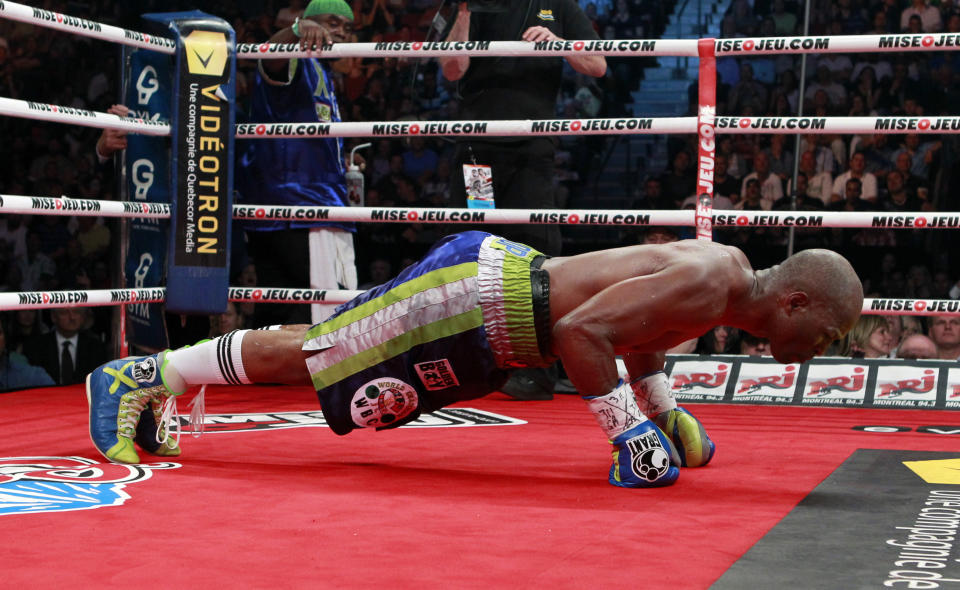From state pen to the Hall of Fame: How Bernard Hopkins became an icon inside and outside the ring

The story has been told thousands of times by now, but as it is so central to the man and, yes, the role model that Bernard Hopkins eventually became, it is worth sharing once again.
In 1988, after serving nearly five years of a strong-arm robbery conviction, Hopkins was leaving the Pennsylvania State Correctional Institution at Graterford. As he was being processed and about to leave, the warden saw him and said something to the effect of, “See you again in about six months.”
To that, Hopkins stopped and said defiantly, “I ain’t ever coming back here.”
Not only did Hopkins never come back, not only did he turn into one of the greatest boxers who ever lived, not only was he elected on Wednesday in his first year of eligibility to the International Boxing Hall of Fame, but he became a role model for thousands of young people.
In addition to Hopkins, also elected were boxers Juan Manuel Marquez, Shane Mosley, Barbara Buttrick, Christy Martin and Lucia Rijker. Non-boxers elected were promoters Lou DiBella, Kathy Duva and the late Dan Goossen, and journalists Bernard Fernandez and Thomas Hauser.
Hopkins became a beacon of hope for the downtrodden, someone who turned his life around and reminded everyone that it’s never too late to do the right thing.
His accomplishments as a boxer, as great as they are, are almost secondary to the man he turned into as he kept the vow he made to the warden as a 23-year-old in 1988 with no job, no education and little hope.
He finished his boxing career with a 55-8-2 record with two no contests and 32 knockouts. His records are legion:
He successfully defended his middleweight title 20 consecutive times.
He became undisputed middleweight champion.
At 46 years, 4 months and 6 days old on May 27, 2011, Hopkins defeated Jean Pascal at the Bell Center in Montreal to win the lineal and WBC light heavyweight titles, becoming the oldest man in boxing history to win a world title.

He was a master of breaking down opponents in the ring, of using verbal warfare and psychological tactics to gain an edge. Prior to fighting Puerto Rican superstar Felix Trinidad for the middleweight title in 2001, Hopkins showed up at a news conference in Puerto Rico and stomped on the country’s flag. He was chased by an angry mob, where he barely escaped. But he’d so enraged Trinidad that he gained a psychological edge in the fight that he easily exploited in winning in a one-sided manner.
He was far more than one of the greatest middleweight champions who ever lived. He showed what was possible with determination, resolve and sheer hard work.
Long after he was a millionaire many times over, Hopkins would boast that he’s a card-carrying member at Costco, where he bought in bulk to save money. It was often humorous to hear him speak of his savings, but he was sending a message to younger fighters about the need to plan and save for the future.
He was an outspoken advocate for fighter rights, starting with himself. He battled with nearly every promoter in the business, as he wouldn’t allow himself to be shorted or slighted or cheated or overlooked. He wouldn’t sign on the dotted line until every “T” was crossed and every “I” was dotted and he was comfortable that he was being treated fairly.
As a world champion, Hopkins testified before Congress in support of the Muhammad Ali Act, which gave boxers numerous protections they didn’t have before, and then returned to speak in favor of a program that was studying fighters’ brain health.
He was the Boxing Writers Association of America’s Fighter of the Year in 2001, but more significantly, he was honored as its Manager of the Year in 2004 for the expert way he’d guided his career.
Hopkins spoke eloquently about the virulence of racism, both within boxing as well as in society. Reporters who wanted a quick sound bite about an upcoming fight and a clichéd response about his opponent dreaded speaking to him, because he’d talk and talk and talk and talk. He was difficult to have as a guest on sports talk radio because he’d talk right into and then through commercial breaks, without so much as coming up for air.
But if one listened carefully to what he was saying, he was delivering an important message. He refused to be stereotyped and was angered when someone judged him solely because of the color of his skin.
He urged fighters to do as he did: To train ferociously, to fight intelligently, to invest their money and to plan for the future.
He went from a troubled young man who terrorized others on the streets of his native Philadelphia to the kind of guy you’d seek out for advice.
He’s become a Hall of Famer because of his excellence with his fists, but he’s so much more than that.
His contributions to society, the example he set in turning his back on a life of crime and becoming an important and respected voice for justice and human rights, far exceed anything he did in the ring.
And as anyone who has watched even a little boxing during his career could tell you, his contributions to the sport as a boxer are legendary.
He’s a Hall of Famer through and through, in life as well as in the ring.
More from Yahoo Sports:


